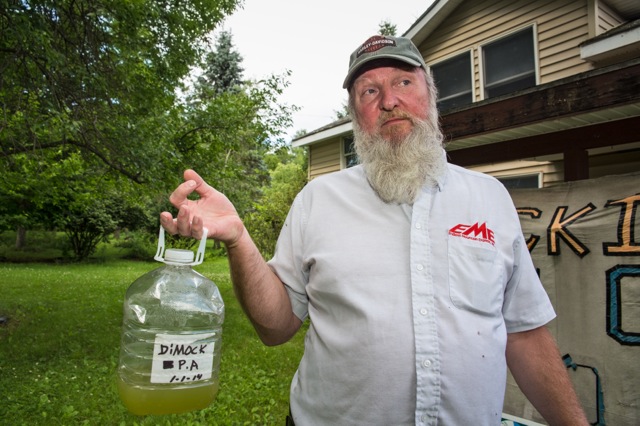
A group of Australians who made a fracking fact-finding trip to the Marcellus Shale region will report to the Australian Parliament before any decisions are made about the future of fracking in South Australia.
In June, the group of twelve Australians – including members of Parliament, farmers, medical and legal professionals – visited communities in Pennsylvania and New York. They saw evidence of contaminated water as a result of accidents and leaks connected to the fracking industry, and met with people both for and against the process.
David Smith, a third generation beef and prime lamb producer from Kalangadoo, organized the trip after he learned the fracking industry was exploring the possibility of fracking in the south east of South Australia. Conventional drilling has been taking place in the region for decades but currently fracking in South Australia is only taking place in the northern part of the state.
Beach Energy currently has two test wells in the south east of South Australia and has yet to ask the government for permission to utilize hydraulic fracturing , although the company is considering fracking as a possibility in the Otway Basin.
Like many before him who learn the fracking industry may come too close for comfort, Smith had known little about it. He devised his own crash course on the topic by contacting people with first-hand experience.
What he learned alarmed him so greatly that he invited a cross section of South Australians, both for and against the industry, to join him in a visit to the Marcellus Shale region.
The geology of the Marcellus closely resembles that of South Australia’s south east, so they could personally witness what could lie ahead for them if the fracking industry took hold in the area.
Doug Shields, a former Pittsburgh Councilman, and Louis Allstadt, a former Mobil Oil executive vice president and a strong voice in the anti-fracking movement, helped Smith set up the itinerary in Pennsylvania and New York. They arranged for notable speakers to address the group, including Cornell University professors Tony Ingraffea and Bob Howarth. Other speakers included SUNY Oneonta professor Ron Bishop; economist Dr. Jannette Bath; Deborah Goldberg, Earthjustice’s managing attorney, and the authors of The Real Cost of Fracking: How America’s Shale Boom is Threatening our Families, Pets and Food, Michelle Bamberger and Robert Oswald.
Smith reached out to Cabot Oil and Gas and other fracking companies in the region to set up a tour of fracking sites, but the industry declined permission for the group to view even a single location. Representatives were unwilling to address the group off-site as well. Only a public relations representative, Joe Massaro from the industry front group Energy In Depth, was made available to the group, according to Smith.
The group, like many others, took a tour led by anti-fracking activist Vera Scroggins instead. Scroggins introduced them to residents whose water was contaminated shortly after the fracking industry boom began in Susquehanna County.
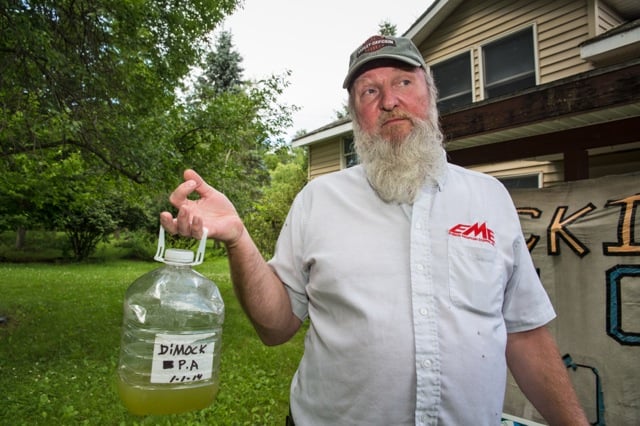 Ray Kem, a former industry worker in Dimock, Pennsylvania, holds up water taken from his contaminated well. (Photo: Julie Dermansky)
Ray Kem, a former industry worker in Dimock, Pennsylvania, holds up water taken from his contaminated well. (Photo: Julie Dermansky)
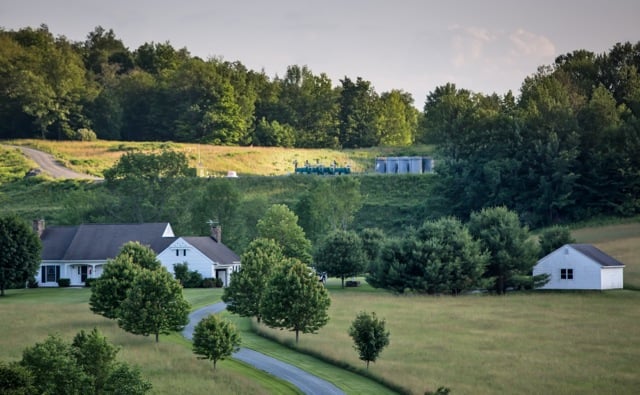 Fracking industry site near a home in Susquehanna County, Pennsylvania. (Photo: Julie Dermansky)
Fracking industry site near a home in Susquehanna County, Pennsylvania. (Photo: Julie Dermansky)
“They seemed open to learn from those who are living with fracking first hand,” Scroggins told DeSmog. She was impressed that the group had come such a long way to learn about the fracking industry.
VIDEO: Adrian Pederick, South Australia Parliament member.
Adrian Pederick, the South Australian Liberal Party Member for the Electorate of Hammond (the Liberal party has been likened to America’s Republican party) asserted that despite what he saw in Pennsylvania, he believes fracking can be done safely if industry is strictly regulated.
He marveled at the accomplishments of the fracking industry and doesn’t doubt it could be good for Australia, but would want things done differently from what he witnessed in Pennsylvania if fracking is permitted in his region.
Pederick has a background working in the oil and gas industry and he was in touch with Energy in Depth, an industry group founded by the Independent Petroleum Association of America. Energy in Depth is openly critical toward some of those the group met with including Scroggins, Bamberger and Oswald.
During a seminar led by Allstadt in Ithaca, NY, Pederick expressed his frustration that the trip was too heavily focused on those who believe they have been wronged by the fracking industry. He wanted to hear from the farmers who want fracking on their land and have been prevented from benefiting from the industry due to New York’s fracking ban.
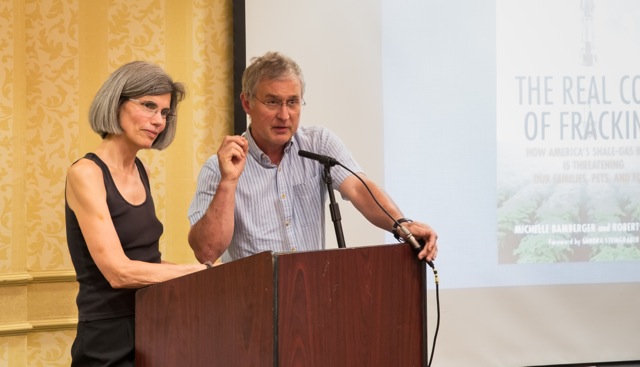 Michelle Bamberger and Robert Oswald respond to Pederick’s question at seminar in Ithaca, New York. (Photo: Julie Dermansky)
Michelle Bamberger and Robert Oswald respond to Pederick’s question at seminar in Ithaca, New York. (Photo: Julie Dermansky)
Though Pederick seemed unimpressed with many of the speakers, he was also not impressed with the way industry is regulated in Pennsylvania.
He sees no reason for fracking to be done so close to residences. When asked how close he would want a fracking rig next to his own land, he replied he would be comfortable with a “1500 yard set back,” approximately 4500 feet.
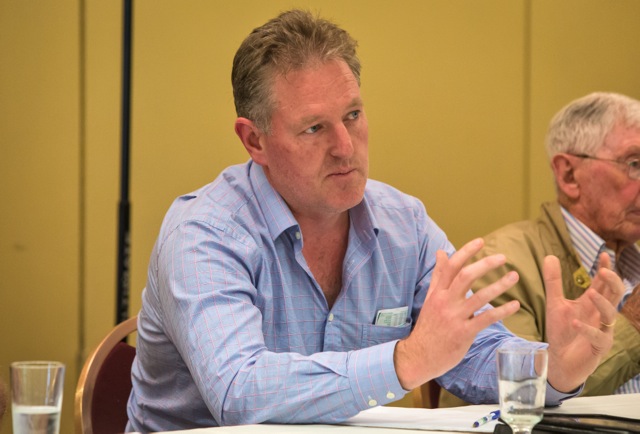 Parliament Member Troy Bell in Ithaca, New York. (Photo: Julie Dermansky)
Parliament Member Troy Bell in Ithaca, New York. (Photo: Julie Dermansky)
“How can you put drill sites right next to people’s houses? That is madness,” fellow Liberal Party MP, Troy Bell told DeSmog. He is convinced the fracking industry has caused contamination in PA. The fact that contamination had occurred surprised him less than the lack of regulations he witnessed.
“Fracking so close to a population base worries me,” Bell said, like what might soon be considered for the south east of South Australia. He wonders if tighter regulations could have prevented the problems he saw in Pennsylvania from occurring. He plans to ask industry many questions upon returning to Australia before he makes any decisions regarding the possibility of fracking in his region.
The Australians have many of the same concerns as Americans when it comes to fracking. They worry about property values, contamination of air and water, and quality of life. What kind of regulations and safeguards will be in place if something goes wrong, and are the trade offs worth the risks?
The potential destruction of farmland and the intrusion of traffic and infrastructure concern Smith, as well as reports of a large increase in birth defects and stillbirths in heavily fracked areas.
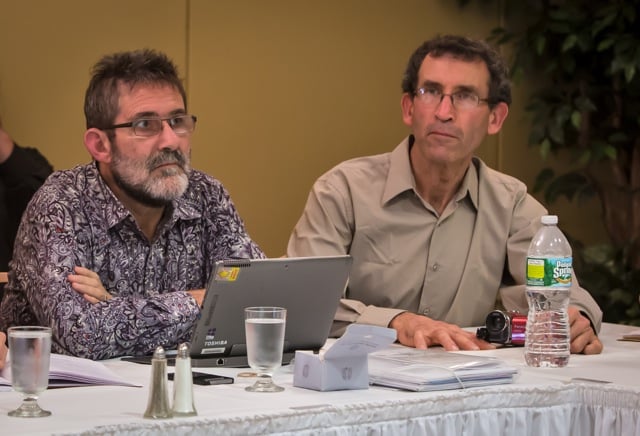 Mark Parnell next to David Smith at a seminar on fracking in Ithaca, New York. (Photo: Julie Dermansky)
Mark Parnell next to David Smith at a seminar on fracking in Ithaca, New York. (Photo: Julie Dermansky)
The trip confirmed much of what Smith learned about fracking beforehand. But seeing the stress endured by people negatively impacted by the industry was eye-opening.
After meeting people whose water has been contaminated and who must now rely on delivered water, and others who are facing health issues or court actions, he is more adamant than ever in his fight to keep the fracking industry out of the south east of South Australia.
VIDEO: Parliamentary leader of the Green Party in South Australia.
Mark Parnell, Parliamentary Leader of South Australia’s Green Party, praised Smith for organizing the trip. Long before the trip Parnell was already certain that welcoming the fracking industry to Australia is the wrong move, since he believes Australia must move toward renewable energy to prevent climate change.
Parnell was surprised by the sheer scale of the fracking industry. The most useful takeaway from the trip for him was meeting with experts who dispelled the myth that the fracking industry is the savior of rural communities. The trip made clear to him that the fracking boom is a short-term phenomenon, but negative impacts from the industry could last forever.
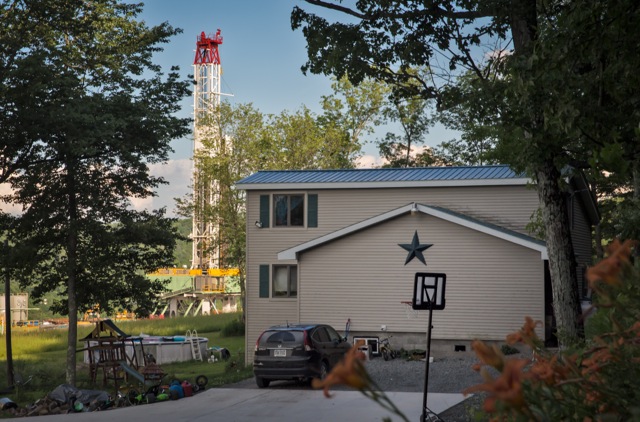 Drilling rig at a fracking industry site in Susquehanna County, Pennsylvania. (Photo: Julie Dermansky)
Drilling rig at a fracking industry site in Susquehanna County, Pennsylvania. (Photo: Julie Dermansky)
Our most important fundraising appeal of the year
December is the most critical time of year for Truthout, because our nonprofit news is funded almost entirely by individual donations from readers like you. So before you navigate away, we ask that you take just a second to support Truthout with a tax-deductible donation.
This year is a little different. We are up against a far-reaching, wide-scale attack on press freedom coming from the Trump administration. 2025 was a year of frightening censorship, news industry corporate consolidation, and worsening financial conditions for progressive nonprofits across the board.
We can only resist Trump’s agenda by cultivating a strong base of support. The right-wing mediasphere is funded comfortably by billionaire owners and venture capitalist philanthropists. At Truthout, we have you.
We’ve set an ambitious target for our year-end campaign — a goal of $250,000 to keep up our fight against authoritarianism in 2026. Please take a meaningful action in this fight: make a one-time or monthly donation to Truthout before December 31. If you have the means, please dig deep.